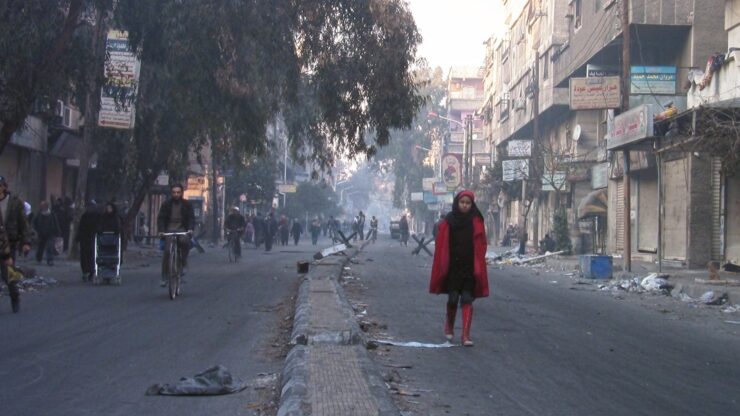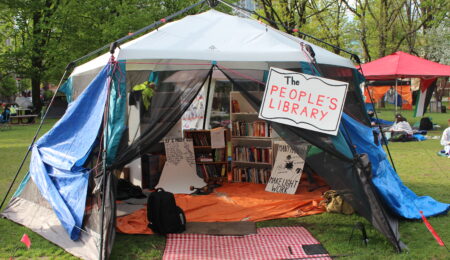A life of starvation
On March 19, the IFFO held a screening for Little Palestine – A Diary of a Siege. This documentary-style film follows life in the streets of Yarmouk, a district in Syria, that housed one of the biggest Palestinian refugee camps from 1957 to 2018.
This film broke my heart. One by one, the narrator shows the lives of different people inside the camps. Whether it’s an elder, a young girl, a mother, or a doctor, they’re all in the same situation; Everyone is starving to death. If they try to escape the refugee camp, they are bombed. Slowly, all their resources are taken away. Families go days without food, babies die from starvation, mothers agonize putting their kids to bed hungry and doctors carry out their practice without proper medication.
One story is of a little girl picking weeds, and stuffing them in her bag in a yard next to debris from fallen buildings. When the cameraman gets closer to her, she smiles. He proceeds to ask, “Are you hungry? When was the last time you ate? Are you happy?”, and so on. To all the questions, her answers were terribly distressing. It was as if an old woman was trapped in an eight-year-old body. She answered with maturity, but there was a sense of tiredness in her voice coming from the experiences she had to endure.
“What do you dream about?”, asked the cameraman, to which she responded, “I don’t dream anymore. There’s no point, I just bring the weeds home so mother can boil them and we have something to eat.”
After a few minutes into the conversation, a bomb fell from the sky into a building next to the yard. The little girl looked up, noticed the damage metres away from her, and immediately went back to picking her weeds as if nothing had happened.
That is her reality. Missing school in order to search the grounds for something edible, being indifferent about bombings because if you’re dead, at least you won’t be hungry. That was life for people in the camps.
On one occasion, a group of leaders led the people towards the exit of the camps. As they were storming towards their freedom, they were bombarded with gunshots and bombs to the point where they had to flee back to the camp in panic amidst the hunger.
There was no escape. Towards the end of the documentary, the cameraman went to a playground and asked a group of boys what they wished for. “I wish for chicken,” “I wish for freedom,” “I wish my brother was still alive,” “I wish my dad was still here.”
Every single boy said something more devastating than the last and yet, they all had smiles on their faces. No one cried, no one was sad. Hunger, death, and devastation were simply part of their daily routine.
Even after all the hardships, the hunger, the cruelty, and the deaths, the people in the camps never lost their sense of joy, longing, and love. People would dance in the streets, sing in groups, play games, and enjoy even the slightest bits of hope found within each other. In a world where inhumanity abides, ambition is never lost.
Children played in the streets, old women laughed with each other, men sang around a piano, and happiness was never truly taken from them. I highly recommend watching this film. The abundance of love contradicts the scarcity of resources in the Siege; a place where above all evil, compassion can surpass.





